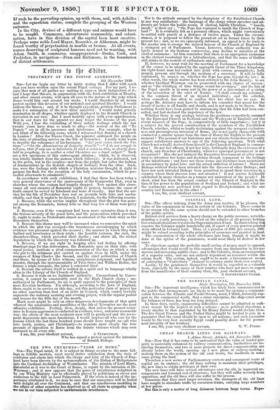THE TWO DMURCHES — "LOOK AT HOME."
Sin—The Papal mind, if it is subject in things secular to the same failings as fallible mortals, must surely derive satisfaction from the state of confusion and alarm into which the clergy and laity of the Church of England have been thrown by the metamorphosis of the Bishop of Melipotamus into the Cardinal-Archbishop of Westminster. The mission of Lord Minto, distasteful as it was to the Court of Rome, is repaid by the intrusion of Dr. Wiseman and it now appears that the game of interference delighted in by our Whig Ministry can be effectually played by politicians as clever and audacious to the full as Lord Palmerston. If the crisis is indeed of the importance attributed to it, we may be sure that our annoyance will be hailed with delight all over the Continent, and that our mischievous meddling in the affairs of other countries has deprived us of all claim to sympathy when we are in our turn subjected to unwarrantable interference.
Nor is the attitude assumed by the champions of the Established Churchan any way satisfactory : the language of the clergy whose speeches and addresses are before the public seems, if clerical, hardly Christian. "Insult, insult," is their cry ; "the Pope has ventured to insult the Church of England !" It is evidently felt as a personal offence, which might conveniently be settled with pistols at a distance of twelve paces. Under the circumstances, it is proposed to follow the precedent set in former times by their present foe ; and, as we are episcopally informed, an appeal is to be made to the secular arm to avenge the injured honour of the Church of England by a stringent act of Parliament. Caesar, however, whose authority was so lately denied in the Gorham controversy, may decline to interfere at the clerical summons : let him remember that there is an appropriate nickname in the clerical vocabulary for a latitudinarian, and that the name of Galileo still stinks in the nostrils of enthusiasts and partisans.
If, however, we must wait for the meeting of Parliament for a knowledge of the course to be adopted by the aggregate Ctesar of the Three Kingdoms, his right-hand man has rushed into print with curious promptitude, both propria persona and through the medium of a secretary. It will be fully considered, he assures us, 'whether the Pope has gone beyond the law ; in other words, the whole matter has been referred to Sir John Romilly, to see whether Cardinal Wiseman can be prosecuted with any chance of success : and so "the whirligig of time brings round his revenges," and the fate of the Papal apostle is in some sort in the power of a descendant of a victim of the revocation of the edict of Nantes. "I shall consult my solicitor," is the common threat of an injured individual ; and the solicitor, when consulted, has often to confess that his client has no case. So perhaps Mr. Attorney may have to inform his consulter that quoad hoe the sword of justice is all handle and sheath, and is not made to be drawn. But nothing would have been gained by announcing that Sir John had been consulted, and had declared the impotency of the law. Whether there is any analogy between the positions respectively assumed by the Episcopal Church in Scotland and the Wesleyans in England and the recent measure of the Pope, is comparatively of little importance ; but it is a subject for the gravest consideration of the members of the Established Church, whether, whilst so loudly declaiming against the arrogant exclusiveness and presumptuous intrusion of Rome, she is not justly chargeable with conduct of a similar nature from the time of Henry the Eighth to the present moment ? The perusal of our historians and our statute-books does not readily suggest satisfactory answers to any of the following questions. With what Church not actually derived from herself is the Church of England in communion? Do not her officers, if not her laity, habitually deny the existence of a church, and therefore of Christianity, wherever episcopal government is not recognized ? Has she not induced the Executive Government of other countries to introduce her forms and doctrines though repugnant to the feelings of the inhabitants ; and have not those forms and doctrines been maintained in ascendancy by penal laws and the actual infliction of torture ? Have not Bishops without Rocks been intruded into the dioceses of other Bishops ; and have not such intruded Bishops been permitted to spend their revenues in a country where their dioceses were not situated ? Is not service habitually' celebrated in many churches in a tongue not understood, of the people ? In short, what has been thh actual conduct of the Church of Englund in the time of her power to the populations of Scotland and Ireland ; and what are the sentiments now professed with regard to Presbyterianism in the one country and Romani.sm in the other ? -I am, Sir, your obedient servant, X.
























 Previous page
Previous page